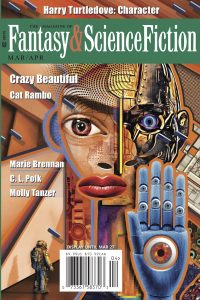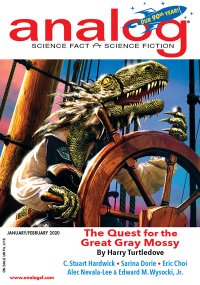Gary K. Wolfe Reviews Sooner or Later Everything Falls into the Sea by Sarah Pinsker
 Sooner or Later Everything Falls into the Sea, Sarah Pinsker (Small Beer 978-1-6187-3155-5, $17.00, 292pp, tp) March 2019.
Sooner or Later Everything Falls into the Sea, Sarah Pinsker (Small Beer 978-1-6187-3155-5, $17.00, 292pp, tp) March 2019.
There are a lot of things to like about Sarah Pinsker’s first collection, Sooner or Later Everything Falls into the Sea, and not the least is a tactful sense of restraint. I don’t mean restraint in telling her tales – Pinsker is willing to try a lot, including a story that explores the role of fiddlers on a generation starship and an Agatha Christie murder mystery in which the victim and all the suspects are Sarah Pinsker – but with over 40 stories to her credit, she’s selected only 12, adding a new one to make a baker’s dozen. What’s tactful (or maybe tactical) about this is that a debut collection, especially from an author whose first novel is still a few months off (A Song for a New Day is due in September), is what it shows us about the writer’s literary range and what she views as important about her work, not simply the degree of her productivity. A good story collection is, at its best, a statement of identity as a writer, partly retrospective but partly aspirational.
Pinsker is a musician and songwriter, so it’s not surprising that music recurs in these stories, and she explores its role in a variety of contexts. “No Lonely Seafarer” combines figures from Greek mythology with the setting and tone of a folk ballad, as the sirens set up shop in a headland near the village of Dog’s Bay, creating a crisis for local commerce (since, obviously, no one can get past their songs). The narrator, who passes as a boy but is actually intersex – and who is also a singer – is recruited by a captain who suspects that a child might be immune to the music. But is it youth or gender or music that is the narrator’s real secret? A similar setting, only in a near-future postapocalyptic world, shows up in the title story, “Sooner or Later Everything Falls Into the Sea”, in which a rock star washes up in a lifeboat in a remote bay, with little initial memory of how she got there, where she is rescued by a reclusive woman who scavenges for a living. There are some predictable elements in the resulting clash between the celebrity culture that the rock star came from (the elite had apparently escaped the worst of the collapse on luxury cruise ships) and the survivalist world her rescuer has retreated to, but the testy, dawning trust between the two women is convincing.
The Nebula Award-winning “Our Lady of the Open Road” effectively evokes “the epic, terrible relentlessness of life on the road” of a live band, in this case made even more desperate by a world in which “StageHolo” – effectively a kind of holographic YouTube – has all but replaced real-life interactions between performer and audience. Perhaps the most heartfelt meditation on the value of music, and folk music in particular, though, is the Hugo- and Nebula Award-nominated “Wind Will Rove”, set on a generation starship whose cultural and artistic records have been wiped out by a disgruntled programmer. The idea of generation-ship voyagers forgetting their past is an old convention of the form, dating back at least to Heinlein’s “Universe”, but here the middle-aged narrator – a history teacher as well as a fiddler – uses it to explore a conundrum faced by any teacher: young people, born on the ship, who see no value in holding on to a past they will never know, versus the argument that memory is a crucial part of identity and purpose. The point is made movingly, if a bit didactically (it’s an argument almost every teacher of history has had to face). The same might be said of another story about the importance of memory, “Remembery Day”, in which an almost magical technology called the Veil suppresses veterans’ memories of a brutal war, “but they push down so many good memories along with the bad ones.”
As with “Remembery Day”, Pinsker’s approach to SF is often fairly minimalist, focusing on a single innovation in the context of a somewhat ominous but partly familiar setting. “The Low Hum of Her” is a variation on Bradbury’s “I Sing the Body Electric” in that the narrator’s father builds a robot grandmother to replace the one who died, given an original twist by being located among refugees in a rather dark future. One of the most moving stories, the Sturgeon Award-winning “In Joy, Knowing the Abyss Behind” (Pinsker has something of a penchant for horizon-gazing titles), again returns to the theme of memory, as the wife of an aging architect, following his disabling stroke, discovers a secret, decades in his past, so disturbing that it effectively derailed his ambitions. Pinsker rather unnecessarily invokes Roswell folklore in revealing the husband’s secret, but her sensitive portrait of decades of courtship and marriage helps make this the most affecting and fully textured tale in the book.
Pinsker’s abiding concern with the saving power of memory – which may be her characteristic theme – may sometimes nudge her toward sentimentality, but there is a counter strain of pure playfulness in her fiction as well. The short and snappy “The Sewell Home for the Temporally Displaced” – which goes on exactly no longer than it needs to – depicts a home for those suffering from “timesling,” randomly perceiving themselves as occupying different historical eras. The one original story, “The Narwhal” (the title refers to a novelty car, not a sea creature) is another road-trip tale, this time satirizing the gig economy, in which the protagonist discovers a quirky small-town “museum” which actually hides a deadly secret. And in what at first seems to be the most narcissistic idea imaginable for a story, “And Then There Were (N-One)”, a method is discovered to visit alternate timelines, resulting in a “SarahCon” in a remote part of Canada in which the various Sarah Pinskers meet up to compare universes and share solutions to worldly problems – until one of them is murdered. The remote location, isolated by bad weather, turns out to be a crucial aspect of the story, since it provides a classic Christie mystery set-up in which the only Sarah with any sort of detective skills – an insurance investigator – is called upon to solve the crime. Far from being the navel-gazing exercise it might have been, it’s a delightful exercise in pure narrative puzzle-solving. There’s also a significant element of crime fiction in “Talking with Dead People”, in which the narrator and her partner build and market precise scale models of murder houses such as Lizzie Borden’s, enhancing them with AIs so packed with every known detail about the crimes that the AIs replicate the personalities of those involved.
Like all innovative short fiction writers, and despite her recurrent concerns with memory and music, Pinsker’s cardinal strength lies in her unpredictability. This may be one reason why she opens her collection with two stories unlike any others in their surreality. In “A Stretch of Highway Two Lanes Wide” a Canadian farm boy whose arm has been ripped off by a combine is fitted with a high-tech prototype prosthetic, which inexplicably feeds back to him the impression that he’s on a remote Colorado highway – or may be a remote Colorado highway. The second story, “And We Were Left Darkling”, may borrow a bit of its hallucinatory group obsession from Close Encounters of the Third Kind, but the disparate group of dreamers here are drawn to a remote beach in California, where their might-have-been dream babies appear by the hundreds out of the surf. It’s an absurdist conceit, but Pinsker’s lovely, elegiac narrative voice makes it oddly convincing. As with so many of the stories here, it’s a voice resonant with feeling and desire. Maybe it’s the voice of a singer.
Gary K. Wolfe is Emeritus Professor of Humanities at Roosevelt University and a reviewer for Locus magazine since 1991. His reviews have been collected in Soundings (BSFA Award 2006; Hugo nominee), Bearings (Hugo nominee 2011), and Sightings (2011), and his Evaporating Genres: Essays on Fantastic Literature (Wesleyan) received the Locus Award in 2012. Earlier books include The Known and the Unknown: The Iconography of Science Fiction (Eaton Award, 1981), Harlan Ellison: The Edge of Forever (with Ellen Weil, 2002), and David Lindsay (1982). For the Library of America, he edited American Science Fiction: Nine Classic Novels of the 1950s in 2012, with a similar set for the 1960s forthcoming. He has received the Pilgrim Award from the Science Fiction Research Association, the Distinguished Scholarship Award from the International Association for the Fantastic in the Arts, and a Special World Fantasy Award for criticism. His 24-lecture series How Great Science Fiction Works appeared from The Great Courses in 2016. He has received six Hugo nominations, two for his reviews collections and four for The Coode Street Podcast, which he has co-hosted with Jonathan Strahan for more than 300 episodes. He lives in Chicago.
This review and more like it in the March 2019 issue of Locus.
 While you are here, please take a moment to support Locus with a one-time or recurring donation. We rely on reader donations to keep the magazine and site going, and would like to keep the site paywall free, but WE NEED YOUR FINANCIAL SUPPORT to continue quality coverage of the science fiction and fantasy field.
While you are here, please take a moment to support Locus with a one-time or recurring donation. We rely on reader donations to keep the magazine and site going, and would like to keep the site paywall free, but WE NEED YOUR FINANCIAL SUPPORT to continue quality coverage of the science fiction and fantasy field.






